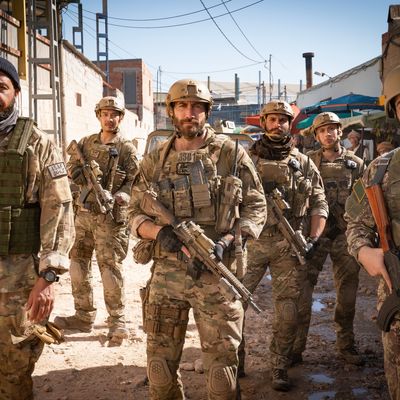
The most touching part of Guy Ritchie’s The Covenant is the end credits, which feature snapshots of real-life American soldiers and their interpreters. As the film reminds us, more than 300 Afghan interpreters and their families have been killed by the Taliban, with thousands more in hiding, despite initial assurances that they would be given special immigration visas to the U.S. That lends The Covenant a veneer of truth, even though the film is not based on a true story. For much of its running time, director Ritchie’s war movie manages to be topical, suspenseful, and moving. But partly because the story is fiction, Ritchie takes a few genre liberties that threaten to undermine the sincerity of his tale.
In fact, The Covenant is basically four movies in one. The first half-hour or so follows a group of U.S. soldiers in Afghanistan, led by Sergeant John Kinley (Jake Gyllenhaal), as they search out hidden Taliban munitions and explosives factories. They’ve just been joined by a new interpreter, Ahmed (Dar Salim), who is there to replace the last one, who was killed in an IED attack in the film’s opening scene. Perhaps as a bit of misdirection, Ritchie flashes the names of the soldiers and their ranks across the screen and has them speak in that quippy, Guy Ritchie style that always sounds like it looked better on the page. As a result, we get the sense that these might be characters we’ll be spending some time with. They’re not. Soon enough, the group is fatally ambushed, with Ahmed and John the only survivors.
At this point, The Covenant becomes a different movie, and a better one, as Ahmed drags John’s heavily wounded body across miles and miles of mountainous Taliban-controlled territory — lying, negotiating, and occasionally stabbing and shooting his way through a dusty hellscape of natural obstacles, war-torn devastation, and endless suspicion. Sometimes we see what’s happening through John’s hazy point of view — he has suffered a concussion, so he’s half-awake but uncomprehending. Because Ritchie is a better director than he is a writer, these extended sequences of dreamy, wordless action showcase his filmmaking at its best.
The movie then switches registers again, as John returns home to pleasant Santa Clarita, California, to his family and his vintage car and truck-servicing business, while Ahmed is left behind in Afghanistan. (All this stuff is in the trailer, so I’m not spoiling anything.) Suffering from both post-traumatic stress and massive guilt, John tries to navigate the military and diplomatic bureaucracy to get Ahmed and his family U.S. visas. Ritchie purposely echoes Ahmed’s struggle to save John, shooting these scenes in an also stylized, dreamy fashion — full of elliptical edits, fragmented compositions, and snatches of conversation. It’s a surprising and poignant doubling of one man’s physical ordeal with the other’s emotional pain.
Gyllenhaal puts valuable mileage on those huge haunted eyes of his during this section. John’s desire to get Ahmed out isn’t just an act of nobility or decency. He barely even remembers what happened in Afghanistan. His compulsion to save Ahmed is an indefinable debt and a gnawing burden — not an act of heroism or nobility, or even an opportunity to return a favor. “As if it wasn’t enough for him to carry me across the mountains, now I can’t get him out of my head,” John tells his wife. “You think he blessed you? Well, he fucking cursed me.” Ritchie has often been drawn to these kinds of obsessive, macho quests, and to men who talk as if they’re already living inside a myth. Sometimes it comes off as ridiculous. But here, lent gravity by the subject matter, by what we’ve already seen Ahmed do, and by Gyllenhaal’s performance, the existential portent feels earned.
That’s also why the film’s final act, which indulges in so many tired action-flick histrionics, feels like such a letdown, as if it’s been airlifted from a different movie. So much that you half-expect Guy Ritchie regular Jason Statham to show up. These final scenes are so disappointing that you may start to wonder what kind of film Ritchie really wanted to make with The Covenant. Was it the sensitive, haunting, well-acted survival drama that it manages to be for much of its running time, or the disposable shoot-’em-up it occasionally turns into?
More Movie Reviews
- The Thriller Drop Is a Perfect Addition to the Bad-First-Date Canon
- The Accountant 2 Can Not Be Taken Seriously
- Another Simple Favor Is So Fun, Until It Gets So Dumb


